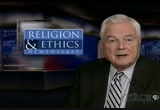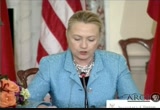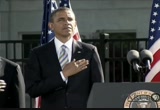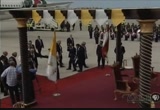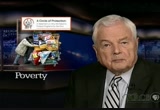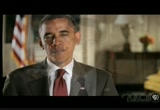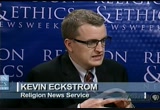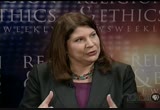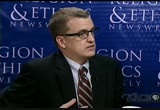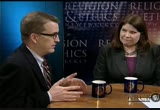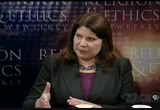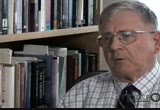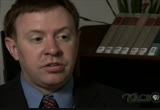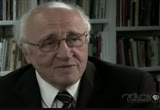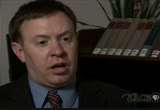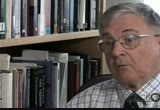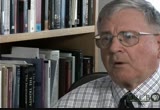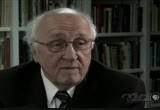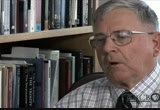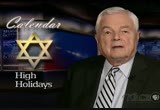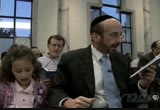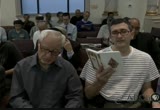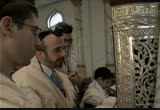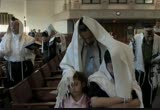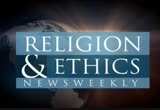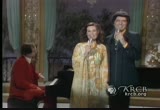tv Religion Ethics Newsweekly PBS September 16, 2012 10:00am-10:30am PDT
10:00 am
10:01 am
welcome, i'm bob abernethy. it's good to have you with us. protests exploded in many parts of the muslim world this week sparked by an online video made in the u.s. that mocks islam and the prophet muhammad. the protests have set off a vigorous international debate about religion and violence and the boundaries between free speech, intolerance and incitement. after ambassador christopher stevens and three other americans were killed in libya, secretary of state hillary
10:02 am
clinton categorically rejected the message of the anti-islam video. at the same time, she reiterated u.s. support for the freedom of expression and deplored the violent response to the video. >> we condemn the violence that has resulted in the strongest terms and we greatly appreciate the many muslims in the united states and around the world who have spoken out on this issue. violence, we believe, has no place in religion and is no way to honor religion. >> also in washington, top interfaith leaders, several of them muslims, came together to denounce the violence. they strongly urged their communities to reject activities and speech that stoke religious hatred. >> we must oppose all efforts to divide people in the united states, in libya, in egypt and around the world along religious
10:03 am
lines. small groups of violent extremists, no matter their religious identity, cannot be allowed to define their religion or their nations. >> we'll have more on all this in a few minutes. >> the protests came as the us marked the 11th anniversary of the 9/11 attacks. many communities held special services to honor those who died on that day. president obama proclaimed september 11th a day of service and remembrance. at a pentagon ceremony, he emphasized that the u.s. inot at war with islam. >> i've always said that our fight is with al qaeda and its affiliates, not with islam or any other religion. this country was built as a beacon of freedom and tolerance. that's what's made us strong, now and forever. meanwhile, pope benedict xvi arrived in lebanon friday for a three day visit.
10:04 am
against the backdrop of continued demonstrations throughout the muslim world and the fighting in neighboring syria, the vatican called the pope's trip a pilgrimage of peace. the visit to lebanon was organized to deliver a message of encouragement to christians there and to urge them to continue being, quote, builders of peace and agents of reconciliation. benedict planned meetings with local muslim leaders, which many observers hoped could be a positive message of interfaith dialogue and respect amid all the regional turmoil. on the heels of the recent political conventions, evgelil grou are continuing thr efforts to mobilize conservative faith- based voters. many leading evangelicals have promised to put aside theological differences with mitt romney, who is mormon, in order to concentrate on public policy. in washington, thousands of
10:05 am
religious conservatives gathered for the annual values voter summit. a parade of top republicans addressed the crowd. one of the keynote speakers was gop vice-presidential candidate paul ryan. >> r mo of us, it was settled long ago that our rights come from nature and nature's god, not from government. also in washington this week, a group of prominent christian leaders called the circle of protection urged president obama and governor romney to make the nation's poor a top priority. the leaders spoke the same day the census bureau released new figures showing the poverty rate remained at a record high last year, 15%. that translates to the highest number since the government began keeping track. >> there's still over 46 million americans living in poverty, in our country. and this is a scandal.
10:06 am
it's a moral failure and we have to respond. at wednesday's press conference, the group also released exclusive videos from both presidential candidates addressing people of faith about poverty. >> my faith teaches me that poverty is a moral issue. the bible calls on us to be our other's keeper and our stes keer and i believe that as a public servant, i must do my part to answer that call. >> both here at home and around the world, good people of faith have dedicated themselves to improving the lives of the less fortunate, providing aid and comfort in places that were once without hope. these kind acts reveal the good heart of america. religious freedom advocates celebrated the release this week of two-high profile prisoners of conscience. in iran, christian pastor youcef nadaani s freed afr almost three years in jail. nadarkani was facing the death
10:07 am
penalty for apostasy. he was convicted of the lesser crime of attempting to convert muslims and was sentenced to time served. meanwhile, in pakistan a young christian girl imprisoned under the country's blasphemy laws was granted bail, although the charges against her have not been dropped. she was taken away from jail by helicopter and is in hiding. the girl was arrested three weeks ago for reportedly burning pages of the koran. later, the local imam who accused her was arrested for allegedly planting the pages in the girl's belongings. there are conflicting reports about the girl's age. her parents say she is 11 and mentally handicapped. the government claims she is 14. joining me now to talk about some of the major news of the week are kim lawton, managing editor of this program and kevin eckstrom, editor-in-chief of
10:08 am
religion news service. kevin, kim, welcome. so kevin, a 14-minute video is posted on youtube and triggers violence all over the muslim world, demonstrations resulting in the death of the u.s. ambassador to libya. what are the messages from all that, especially the religious messages? >> well i think, you know, we live in this increasingly smaller world, interconnected world and things that happen in one place instantaneously affect things in another place and religion obviously is playing a larger and larger role in global fairs and what you've seen, i think, this week is that one of the greatest barriers to interfaith understanding is actually technology and the ability to get these messages out. you know, five years ago, ten years ago, somebody could have made a video like this and nobody ever would have seen it but now you can post it on youtube or you can put it on twitter or facebook and it's around the world instantaneously and it automatically pits one religion against another and that's a huge challenge that
10:09 am
nobody, i think, has quite figured out how to deal with just yet. >> and it was interesting watching some of the debate within the religious community because there was sort of a little difficulty over the emphis and a lot of the interfaith leaders blamed the video, and you know, really were harsh on the video in saying it provoked all of this, and then other people were saying well wait a minute, what's the responsibility of the people who were perpetrating all the violence and what responsibility do they have and you know there was talk even in political circles. were people too sympathetic towards those doing violence, and even if you don't like a video or even if it's ofnsive to your ligion, is it justified or even if you try to understand why the violence was committed, how strongly do you, you know, blame the video versus blaming the violent behavior. >> and it shows the volatility in the muslim world and the enormous role and passion that goes along with the religion. >> right, this is sort of a crash course for a lot of people
10:10 am
into islam again. but also, you know, why depictions of the prophet muhammad are so problematic and why muslims are so sensitive about that and it shows that, you know, this is not just a religious question but whenever you are dealing with the muslim world that religion and politics are intermarried and one thing is going to affect the other so this is not just about christians versus muslims or jews versus muslims. i mean, this is about egypt versus the united states. it takes on a whole new meaning when you get into this arena. >> and many of them apparently don't have much of an understanding of the role of free speech in this country. >> well, this has been a big international debate. i was actually at a conference a couple years ago with journalists talking about this notion of defamation of religion and should it be criminalized. there's been a movement in the u.n. to actually make it a crime to defame someone's religion and a lot of people don't see insulting someone's religion as free speech and we might say
10:11 am
here in the united states, "well, i don't like that, but that's free speech." but in other contexts they see religion as something different and it's not free speech in their minds to do something offensive but you know for us, the question becomes well who makes that determination and what's offensive to me may not be offensive to you. >> and there was, you know, i was really struck watching the video coming out of cairo and the people in the streets were saying obama knew about this, you know, obama could have stopped this video, he has the best intelligence agency in the world and he could stop this video and he has to put an end to this. well, he can't do that at all. and so there's this large gap that i think we've seen this week exposed between sort of the western notions of freedom of speech, freedom of press, and the same notions in the muslim world that are just vastly different. >> and you can't stop it, but religious leaders, both muslims and christians and others in thisount, cacome out very strongly, as some of them did
10:12 am
this week, saying no, don't demonize anybody else's religion. >> that was certainly one message we heard from the interfaith community, urging their members, don't, you know, put out things that might stoke tensions. i was also surprised to see and interested to watch some of the reaction in the muslim community. while many muslim leaders certainly didn't like the video and denounced the video, i did hear some pretty strong statements directed at their own community. i mean, the muslim public affairs councilelead a statement saying we look to our muslim leadership to reflect on how we've come to such an extreme point in our own community, as well. >> kim lawton and kevin eckstrom, many thanks to you both. >> thank you. for many years, there's been an often heated dispute between mormons and some evangelicals about whether mormonism is really part of christianity. we have a special report today
10:13 am
from lucky severson about the evangelil chges, and the criticism some of them have provoked. >> reporter: this is the mormon temple in salt lake city, epicenter of the church of jesus christ of latter-day saints. there's been a lot of criticism about mormonism, especially among evangelicals like stephen davis. he's a religious scholar at claremont mckenna college. >> if the question is, is mormonism a legitimate expression of christianity, honestly i would have to say no. i think that legitimate expressions of christianity can be found in roman catholicism, eastern orthodoxy, and protest tant -- protestantism. >> mormons take real offense when people tell them that they're not christian. >> patrick mason is the chairman
10:14 am
of mormon studies at claremont graduate university and a mormon himself. >> if christian defines what is your relationship with jesus, do you believe that salvation comes through jesus, do you worship jesus christ -- then no doubt mormons are christians. i mean, they'll be the first to tell you, look at the name of the church, the church of jesus christ of latter-day saints. >> reporter: mason says antagonism toward mormons stretches back to the beginning of the church. they've been called a cult, demonic, a false religion with a false prophet. >> mormons in a lot of ways are scarred from a long history of misrepresentation in what they see as false reports about the church or unfair treatment of the church. this goes all the way back to the 1830s. >> reporter: that was when joseph smith said he had a revelation where jesus told him all the religions at that time were an abomination in his sight. from then on morms, who were seen by some as lower-class, superstitious dupes, were the target of ridicule and violence eventually leading up to the assassination of joseph smith. in the mid-1850s, the government
10:15 am
sent the army out to utah to keep an eye on the mormons. the army established this fort above salt lake city. the cannons that were here were aimed at the mormons. but the most vocal critics of mormons have long been evangelicals. richard mouw, professor of christian phosophy at the fuller school of theoly, says one reason is because mormons have been such good proslytizers. >> mormonism began as this evangelistic program of going out and getting converts, and very often converts from the traditional denominations, and so evangelicals and mormons have had an unusually hostile relationship over the years because they have been sort of competing proselytizing programs, but also they traded the rhetoric in very hostile terms. >> there's a sense of them-against-us that in some ways gets inflated among the grassroots membership the chur. but there is no doubt that for many people they see evangelicals as the enemy, and they need to be converted. >> reporter: among scholars, the important distinction between
10:16 am
mormonism and most mainstream christian churches centers on theology. >> the mormon view of the godhead is that god, jesus christ, and the holy spirit are three separate beings, so mormons reject a trinitarian notion that they're three in one. mormons see them as three distinct and separate beings. >> and evangelical christians, like all mainstream christians, want to say that father, son, and holy spirit are one in some really strong, ontological sens >> and mormons also have an idea that they're not -- that god is not ontologically different than humans, so god and humans are essentially the same species, that humans can progress to eventually become like god. god is not radically other, but in scenes approachable and understandable and knowable. >> the idea that as man is god once was. the idea that god, the god whom we worship, was once a human being and then grew to be god, grew to godhood, will strike most evangelical christians as
10:17 am
being blasphemous. >> reporter: another fundamental difference is that mormons rely on more than just the bible for the word of god. >> certainly mormons don't believe in the bible as the only word of god. they believe in an open canon and that god continues to speak to prophets today. >> they believe in continuing revelation. they have three other books, the book of mormon, the pearl of great price and a book called doctrines and covenants, and evangelical christians would never accept that those books are inspired or the word of god or are prophetic. >> so i oen say that the bad news about mormonism is that they believe in continuing revelation. the good news about mormonism is that they believe in continuing revelation. they might actually, in continuing revelation, begin to modify and alter some of the things that they see themselves as having received in earlier revelation. >> reporter: mormon theology has changed over the years after church prophets have received new revelations. it wasn't until the 1970s that the church allowed blacks to
10:18 am
hold the priesthood. and the church's policy allowing plural marria wasbanded the 1890s after a prophetic revelation. >> a lot of americans are suspicious of mormons over the issue of polygamy, which should have gone away a long time ago. but the problem is that there are these mormon fundamentalist sects, especially in southern utah and northern arizona, that still practice polygamy, and i think that gets a lot of the american people confused about what the mormon church's position really is. >> reporter: as for lingering animosity today, professor mouw says some of it is because the mormon church hagrown so big d prperous. >> and i think it has something to do with the growth of mormonism. while on the one hand they're entering into the mainstream in a lot of ways, they're also a very powerful presence globally, 14 million mormons around the world. they're identified with some of the major businesses. there's the sense that it's a juggernaut, that it has tremendous clout. >> reporter: as for the claims
10:19 am
that mormonism is a cult, professor mouw takes exception. >> one reason why i don't think it's very helpful to call mormonism a cult is that they have a world-class univsity. they have scholars who consider all kinds of complex topics. you know, scientology doesn't have a world-class university. hari krishna doesn't, jehovah witnesses don't. but mormonism has pretty much entered into the mainstream of intellectual life. >> reporter: mouw goes even further, accusing some some of mormonism's accusers of shading the truth. >> i think the motives of people who often attack, for example, attack mormons as evangelical leaders or other kinds of chstialeaders is that they do want to protect their people against falsehood, against being led astray. but when it comes in terms of standing up for the truth, if you tell falsehoods about another religion that's bearing false witness against our neighbors. >> reporter: mouw expressed
10:20 am
those sentiments to a packed house at the mormon tabernacle. his words did not sit well with many evangelicals. >> the press the next morning, the big story was "fuller seminary president says we've sinned against mormons," and boy, i get hate mail yet on that. >> i think we have not bn fair. there's a lot of anti-mormon apologetics that are out there and anti-mormon polemics, where unfair charges are made against the mormons. i think that's absolutely right. >> reporter: the bias against mormonism has been a problem for mitt romney's campaign. but attitudes seem to be changing. a recent poll by the pew research center found that eight of ten voters who know mitt romney is a mormon say they are either comfortable with his faith or it doesn't matter to them. for "religion and ethics newsweekly," i'm lucky severson in salt lake city.
10:21 am
on our calendar this week, hindus celebrate ganesha chaturthi the ten-day festival dedicated to the popular elephant-headed god, lord ganesha. clay figures of the deity are often made and immersed in lakes and rivers. in some parts of india this year, artisans are using eco-friendly materials to help reduce water pollution. finally, the jewish high holidays begin this weekend with the jewish new year rosh hashanah. sephardic jews, most of whom trace their heritage to spain and the middle east, have a special worship service to prepare spiritually for the holidays. we spoke with rabbi joshua maroof of the magen david sephardic congregation in rockville, maryland, about the 40 days of prayers for
10:22 am
forgiveness. >> selichot literally means prayers for forgiveness and this tradition is a very ancient one it goes back at least a thousand years if not more. when sephardic jews recite selichot, even though the content is serious and one can say it's even somber, there is a joy to the way that we recite selichot. there's an excitement, there's an energy, a happiness to it because this reconnecting with god in advance of the high holiday places us in us a spiritual state that's so much more conducive to really being able to enjoy and get the most out of rosh hashanah and yom kippur out of the high holidays
10:23 am
are just around the corner. the term sephardic is originally derived from the word sepharad which meanspain. ourwn congregion we have jews from the whole gamut of what would now be called sephardic jewry including many, many jews from morocco, in particular, iraqi jews, iranian, syrian, indian jews, jews from north africa who may or may not be of spanish decent. our melodies are a blend of predominantly moroccan melodies because we have such a large and vibrant moroccan jewish community, but also what is called yerushalmi. yerushalmi is a style of music which is really based on the arabic styles of music and is primarily the style of prayer of the syrian jews. the shofar on rosh hashanah is supposed to signify our crying out to god, a crying that can't be arctticulated in words. something that's coming from the
10:24 am
heart. we have our torah in a hard case. the middle eastern jews had this practice of putting their torahs into a hard case. on the new year on rosh hashanah, we are reading about abraham being faced with the challenge the test of having to hypothetically sacrifice his son, isaac, and in the context of the high holidays what it makes us think about obviously is willingness to dedicate ourselves to a higher purpose. when the jews committed the sin of worshipping the golden calf in the book of exodus, we are told that moses goes unto the mountain, back up to mount sinai for 40 days to pray for forgiveness, and according to tradition god finally forgave the jews on yom kippur, on the
10:25 am
day of atonement that so 40 day period that moses was praying on the mountain is the 40 day period we pray selichot, our own supplications for forgiveness. one of the things we ask god for is for the time to be able to correct to be able to rectify errors that we made, and be able to rise above them with the full recognition that nobody knows what day is really going to be their last. it can be overwhelming when people think about the ultimate judgment before god and the sense of destiny, the sense of mortality that we are preoccupied with, but when one considers that god is willing to take all of that off your shoulders as long as you're doing what you can to take a few steps in the right direction it's a very positive and inspiring and comforting message i believe. >> that's our program for now. i'm bob abernethy. you can follow us on twitter and facebook and watch us anytime on smartphones. there'much more on oureb ite wel includingore the jewish high holidays. you can comment on all of our stories and share them. audio and video podcasts are
10:26 am
534 Views
IN COLLECTIONS
KRCB (PBS) Television Archive
Television Archive  Television Archive News Search Service
Television Archive News Search Service 
Uploaded by TV Archive on

 Live Music Archive
Live Music Archive Librivox Free Audio
Librivox Free Audio Metropolitan Museum
Metropolitan Museum Cleveland Museum of Art
Cleveland Museum of Art Internet Arcade
Internet Arcade Console Living Room
Console Living Room Books to Borrow
Books to Borrow Open Library
Open Library TV News
TV News Understanding 9/11
Understanding 9/11
